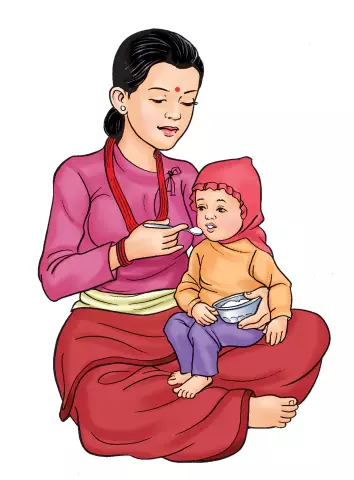- Author Rachel Wainwright wainwright@abchealthonline.com.
- Public 2023-12-15 07:39.
- Last modified 2025-11-02 20:14.
Consequences of artificial feeding for child health
Manufacturers of infant formula for babies assure: all these mixtures are ideally balanced and adapted for babies. If a mother has to artificially feed her baby due to health problems - yes, you cannot do without milk substitutes. However, pediatricians note that it is not so rare that women, without good reason, do not want to breastfeed a child for a long time or are not going to do it at all, relying on milk formulas. Common reasons for such a decision are the desire to go to work as soon as possible, the unwillingness to lose the shape of the breast, the belief that lactation is already very weak, so there is no point in struggling with its establishment.

Source: depositphotos.com
Meanwhile, the World Health Organization (WHO) strongly recommends to adhere to breastfeeding in the first six months of a child's life, and then introduce complementary foods, while maintaining access to breast milk for up to 2 years. The information below may help you decide on how to feed.
Immunity, allergies and respiratory diseases
The main problem of “artificial” children is lowered immunity. So, with the introduction of vaccines, the immune response is achieved faster in breastfed children. The study was carried out by comparing the results of immunological examination in children aged 1, 3, 6 months and a year. Conclusion - breastfeeding, in contrast to artificial, supports immunity and prevents the development of allergic diseases.
With allergies or, even worse, asthma, things are not the best for "artificial", and in all countries of the world. In Finland, studies have confirmed that eczema, atopic reactions, food and respiratory allergies are much more common in infants fed with milk substitutes. In Brazil, the incidence of pneumonia among "artificial" people is 16.7 times higher than among breastfed children. In the USA, more than 1000 children were studied, trying to establish a connection between the type of feeding and recurrent bronchial obstruction, and the incidence of the disease in "artificial" was 3 times higher. More than 2,000 children were examined at a hospital in Toronto, and according to doctors, the risks of asthma and recurrent bronchial obstruction in "artificial" people are 50% higher. In Western Australia, the results are similar:risks are 40% higher.
In general, the analysis of statistics showed that in developed countries, where children are fed milk substitutes more often, they are more susceptible to respiratory diseases.
Digestion
Digestive problems are very common with bottle feeding. The researchers attribute this to the fact that breast milk has a significant protective effect in inflammatory bowel disease. So, Canadian scientists, examining a group of children, found that those of them who were breastfed had intestinal infections almost half as often.
Cases of diarrhea also occur in artificial people at least 2 times more often.
Cardiovascular diseases
Formula feeding during childhood can have a direct impact on adult health. This is due, firstly, to the fact that the blood pressure of "artificial" is higher, and secondly, to the fact that breastfeeding reduces the level of cholesterol and lipoproteins. Thus, there is every reason to believe that high-grade breastfeeding provides a low level of cholesterol in the future and is the prevention of cardiovascular diseases.
Diabetes and obesity
Another unpleasant conclusion, which was reached by scientists in several countries at once: the "artificial" more often have diabetes of the 1st and 2nd types. But breastfeeding for at least the first 5 months of life is an excellent prevention of this disease.
As for obesity, it is much more susceptible to it in children who were fed with breast milk substitutes. Scientists attribute this to the presence of a number of hormones in it that are absent in mixtures. It should be borne in mind that obesity may not appear immediately - already at school age. But if you breastfeed for at least 6 months, then the risk of obesity for a child is reduced by 60%.

Source: depositphotos.com
Mental development
Here, scientists also observe a clear correlation: breastfeeding has a much better effect on the intelligence and cognition of children. One hypothesis links this to the effect of breast milk on brain growth, especially white matter.
Children who were artificially fed showed lower results in all tests in terms of intelligence, motor skills, and speech.
And…
Breastfeeding reduces the incidence of cancer and multiple sclerosis. Several studies have shown a very specific link between artificial nutrition and the incidence of autism. "Artists" also more often suffer from otitis media and decreased visual acuity. Finally, neonatal mortality among "artificial" is higher than among children who received breast in the first day of life. The same applies to sudden infant death syndrome.
Against the background of such disappointing facts, the risk of malocclusion in children who feed on a mixture from a bottle looks quite insignificant.
Scientists all over the world point out that the occurrence of various diseases in children and artificial feeding are directly related. Therefore, if your baby is an “artificial” against his will, pay maximum attention to his health. If you are in doubt about whether it is worth spending a year of your life breastfeeding, we hope that you will come to the conclusion: for your baby's health, breast milk is the most important thing that cannot be replaced with anything.
YouTube video related to the article:

Maria Kulkes Medical journalist About the author
Education: First Moscow State Medical University named after I. M. Sechenov, specialty "General Medicine".
Found a mistake in the text? Select it and press Ctrl + Enter.






